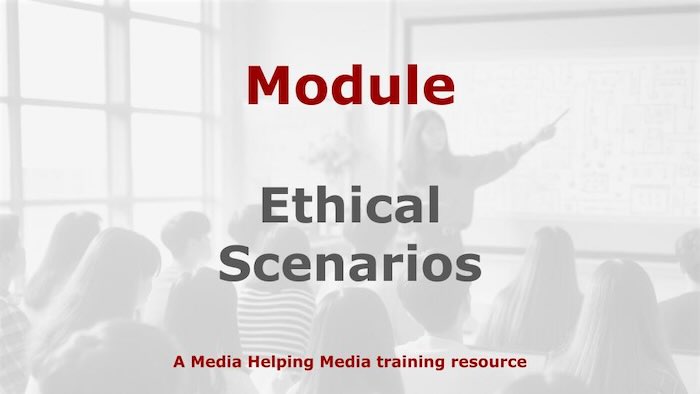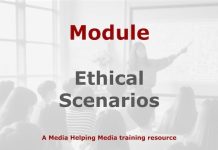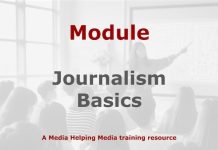 This free six-week module is designed to help journalism students recognise and deal with some of the common ethical challenges involved in newsgathering.
This free six-week module is designed to help journalism students recognise and deal with some of the common ethical challenges involved in newsgathering.
It’s designed for college and university lecturers to download and adapt for local conditions.
The module offers practical, scenario-based training designed to prepare journalism students and early-career professionals to navigate common ethical dilemmas with confidence.
Drawing on real-world cases from the Media Helping Media ethics section, the module explores issues such as accuracy, impartiality, privacy, consent, and public interest, encouraging critical thinking and principled decision-making.
Fully adaptable and free to download, this module equips future journalists to uphold the highest ethical standards, balancing their vital role in informing the public with respect for the individuals and communities they cover.
Teachers should consider using this module in conjunction with one of our other six-week modules ‘Editorial ethics for journalists’
Week 1: Introduction to editorial ethics
Topics:
- Trust: The foundation of ethical journalism is trust, which is built through consistent, principled editorial decisions. This is why editorial ethics are important.
- Choices: Journalists must often make tough choices where the right course of action is not always clear, and must balance competing interests. Everything they do must be in the public interest.
- Values: Encourage students to examine their own editorial ethics to see if they are up to standard.
Scenario:
- Journalistic ethics – scenario: A reporter investigating a controversial development feels ethically compromised after previously accepting lavish hospitality from the developer, who now pressures them for favourable coverage by threatening to expose this past relationship.
Week 2: Accuracy and integrity
Topics:
- Accuracy is the cornerstone of credible journalism. Reporters must verify facts, avoid speculation, and correct errors promptly.
- Integrity includes resisting pressure to withhold or distort information, even when under threat or facing personal risk.
Scenarios:
- Accuracy – scenario: A reporter covering an industrial dispute at a factory observes a mass walkout and an empty staff car park, contradicting the company’s claim that half the workforce defied the strike and supporting the union’s assertion that all members participated in the industrial action.
- Journalistic integrity – scenario: A political correspondent is invited to speak at a party-organised event and then offered a lucrative fee and a gift to privately coach politicians, raising ethical concerns about impartiality and conflicts of interest.
- Withholding information – scenario: A journalist discovers a free, volunteer-run alternative to a paid service featured in a story and must decide whether to include this new information to better inform readers or withhold it as originally directed by the editor.
Week 3: Fairness, impartiality, and conflicts of interest
Topics:
- Journalists must avoid bias and ensure all relevant voices are heard, especially in contentious stories.
- Conflicts of interest – real or perceived – must be declared and managed to protect credibility.
Scenarios:
- Editorial impartiality – scenario: A reporter investigating medical malpractice at a hospital faces a conflict of interest when they discover the consultant involved is a relative, forcing them to choose between family loyalty and their ethical duty to report the facts.
- Scenario: Conflict of interests: A political correspondent is offered a large sum by a lobbying firm to train its staff on influencing media coverage, raising ethical concerns about impartiality and conflicts of interest.
- Testing boundaries – scenario: An editor at a government radio news service in a developing democracy must decide whether to break protocol and risk their job by broadcasting urgent information about an impending famine – potentially saving lives but defying government wishes to suppress the story.
Week 4: Privacy, consent, and legal challenges
Topics:
- Journalists must respect individuals’ privacy, especially in sensitive situations, and seek informed consent where appropriate.
- Legal threats and trespass issues are common challenges, requiring careful navigation to avoid legal repercussions. In some cases journalists should take legal advice.
Scenarios:
- Privacy protection – scenario: An editor of a news website faces an ethical dilemma when a duty editor publishes a graphic image of a dead man with his face visible to illustrate breaking news about foreign conflict, raising concerns about sensitivity and appropriateness.
- Informed consent – scenario: A reporter films a traumatised woman after a fire for a dramatic news segment, only to learn afterward that her distress is due to her missing, likely deceased child, raising serious ethical questions about using the footage.
- Legal threats – scenario: A local newspaper reporter faces legal threats from a pub proprietor after publishing a factual report on a licensing application without the “positive spin” the applicant demanded, despite following standard journalistic procedures and including all required information
- Trespass and journalism – scenario: A radio reporter, seeking to accurately inform the public about striking shipyard workers’ living conditions, illegally boards an occupied vessel to gather firsthand accounts, risking legal action in order to report the essential story.
Week 5: Sensitive reporting and emotional challenges
Topics:
- Reporting on tragedy or trauma requires sensitivity, empathy, and respect for those affected.
- Journalists must be aware of their own emotional responses and avoid making assumptions under pressure.
Scenarios:
- Covering a tragedy – scenario: A journalist covering a football match disaster must choose between helping victims or continuing to report the unfolding tragedy, highlighting the ethical dilemma of becoming part of the story and the need for editorial support in such situations
- Emotional pressure – scenario: A reporter covering a court case is emotionally pressured and physically threatened by a defendant’s family to suppress a story, raising the ethical challenge of maintaining fair and accurate reporting despite intimidation and personal risk
- Emotional assumptions – scenario: A young reporter, influenced by personal emotions and assumptions rather than verified facts, misreports a fire scene as residents salvaging belongings when it was actually looting, resulting in the spread of misinformation
- Interviewing integrity – scenario: An award-winning investigative journalist, newly hired as a national TV presenter, discovers her employer has a secret, corrupt deal with a government minister, forcing her to choose between staying silent, confronting management, resigning quietly, or exposing the corruption
Week 6: Transparency, public interest, and professional boundaries
Topics:
- Journalists must be transparent about their methods and disclose relevant information to audiences.
- Deciding what is in the public interest requires careful judgement, especially when information could cause harm.
- Professional boundaries – such as off-the-record conversations and returning favours – must be clearly defined.
Scenarios:
- Public interest – scenario: A political news editor must decide whether to report on a government minister’s adult son being questioned by police about drugs, recognising that while the story is only newsworthy due to the family connection, it lacks genuine public interest and should be monitored but not actively pursued unless new, relevant angles emerge.
- Off-the-record chat – scenario: A journalist who receives off-the-record information about a major news event must weigh ethical obligations, considering whether to respect the source’s conditions, use the information as background for further investigation, or refer up to editorial management before taking any action.
- Returning favours – scenario: A young parliamentary reporter’s early interview success with a government minister leads to an ethical dilemma when the minister expects favourable coverage in return, pressuring the journalist to compromise their independence.
- Transparency and full disclosure – scenario: A reporter embedded with the military in a war zone discovers – after briefly escaping official supervision – a story from local residents about ongoing dangers and neglect that the army would prefer to keep hidden, creating an ethical dilemma about what to report.
- Right of reply – scenario: Journalists should offer a right of reply whenever a subject or their position is criticised or challenged in coverage, ensuring fairness and accuracy by allowing those affected to respond to claims made about them.
- Photo journalism – scenario: A reporter, believing they have captured a powerful news image of an abandoned, grieving child at a border crossing, discovers the facts were different when the child’s mother reappears, highlighting the risks of misinterpreting events in breaking news situations
Teaching tips
- Use each scenario as a springboard for group discussion, role-play, or written reflection.
- Encourage students to reference relevant codes of conduct when debating scenarios.
- Invite guest speakers who have faced similar dilemmas in their careers.
Summary
This module now provides a practical, discussion-based approach to ethical training, drawing directly from real-world editorial scenarios. Each week’s session is designed to foster critical thinking and ethical decision-making, preparing students for the complex challenges of modern journalism.








